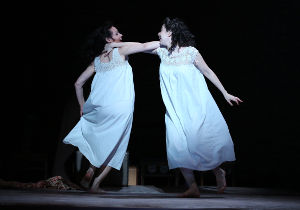
Glenda Frank
|
Love in the Rain “Indecent,” a play with music by
Paula Vogel. Directed by Rebecca Taichman. Cort Theatre, 138
W. 48 St, NYC. April 4, 2017 -- open run.
Tuesday & Thursday @ 7 PM; Wednesday, Friday & Saturday
@ 8 PM; Wednesday & Saturday @ 2 PM; Sunday @ 3 PM. $39-129.
For tickets and information, call 212-239-6200 or 800-447-7400,
visit the box office or www.telecharge.com “Hot ‘N’ Throbbing” (about a single mom who scripts porn). “The Oldest Profession” (about prostitutes over 65). “How I Learned to Drive” (about pedophilia). “Desdemona” (a play about a handkerchief). And half a dozen other plays which won Paula Vogel Pulitzer Prize, Obie, and Lily awards. And her latest, “Indecent” (about a brothel, the Holocaust, and first love). Paula Vogel with her signature take on sex is on Broadway with a
magnificent new play in a brilliant production directed and co-created
by Rebecca Taichman (“How to Transcend a Happy Marriage.”)
This is Vogel’s most nuanced play. It has an emotional and historical
range, characters who are easy to love and understand, and romances
– gay, straight, and other. Plus music and dance interludes.
Asch wrote his first and only play at 26. It was an angry young man’s
play, with lots of forbidden fruit: attacking the roots of piety,
the image of Jews, and patriarchal domination of women. Yekel, the
protagonist, is an observant Jew who makes money from a stable of
prostitutes. His wife (Mimi Lieber) once worked for him. He plans
to wed his daughter to a rabbinical student and has commissioned a
Torah (a handwritten scroll) as a token of his contrition. But daughter
Rifkele has fallen in love with Manke, one of the prostitutes, and
refuses to marry a man her father selects. In rage, Yekel lifts the
Torah about his head to smash it on the ground, which probably offended
and titillated the audience at least as much as the love scenes between
the two girls (Katrina Lenk and Adina Verson). Some of their dialogue,
according to Vogel’s script, came from Ashe’s private
moments with Madje (Adina Verson), his bride. The play touches so many chords. It tells about the discovery of love by two teenagers girls. The scene in the summer rain is tender and joyful, both a modest wet t-shirt moment and a cleansing for the lovers. It is the first lesbian kiss on stage. The actors who play these roles in America are also lovers, arguing, breaking up, forgiving each other. Asch (Max Gordon Moore as the young playwright, and Tom Nelis as the aging novelist) and his wife have grown old together, but theirs is a marriage that deepens over time. Lemml’s passion is “The God of Vengeance,” the play that changed his life. “Indecent” is also a lament for those lost to the Holocaust. The forces of repression are everywhere, from Peretz’s reaction to the play and the Broadway censors’ condemnation to the horror of the Final Solution. We meet the cast in their somber costumes (Emily Rebholz) aligned against the back wall. Dust falls from their hair and sleeves as they dance. As this effect is reprised, it becomes increasingly poignant and powerful. The word “indecent” takes on multiple meanings as the play progresses. What began as a comment on the love scenes in “The God of Vengeance” becomes comments on intolerance and genocide. Projections in English and Hebrew by Tal Yarden; lighting by Christopher Akerlind; set by Riccardo Hernandez, for whom the many suitcases carried by the cast can become a bed, a chair, a dance accessory, and contain the props needed for the production. The play has had an impressive trajectory, from a 2015 production at Yale Repertory Theatre, to the off-Broadway Vineyard Theatre in 2016, and now Paula Vogel’s Broadway debut. In her many productive years since her first play, Vogel has been attracting a loyal audience. We celebrate her voice, the gifted Rebecca Taichman, and this auspicious production of “Indecent.” |
| museums | NYTW mail | recordings | coupons | publications | classified |

